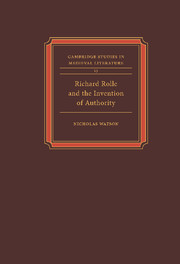Book contents
- Frontmatter
- Contents
- Preface
- List of abbreviations
- Introduction: Contexts: three preliminary essays
- PART I
- 1 Interpreting Rolle's life
- 2 The structure of Rolle's thought
- PART II
- PART III
- PART IV
- Epilogue: Rolle as a late medieval Auctor
- Excursus I: The chronology of Rolle's writings
- Excursus II: Rolle's reading and the reliability of the Officium
- Notes
- Bibliography
- Index
2 - The structure of Rolle's thought
Published online by Cambridge University Press: 04 December 2009
- Frontmatter
- Contents
- Preface
- List of abbreviations
- Introduction: Contexts: three preliminary essays
- PART I
- 1 Interpreting Rolle's life
- 2 The structure of Rolle's thought
- PART II
- PART III
- PART IV
- Epilogue: Rolle as a late medieval Auctor
- Excursus I: The chronology of Rolle's writings
- Excursus II: Rolle's reading and the reliability of the Officium
- Notes
- Bibliography
- Index
Summary
Much of the previous chapter tries to explain why Rolle was so vulnerable to criticism, by indicating ways in which his eremitic life might have seemed anomalous to his contemporaries. This chapter examines the major themes of his writing, through which he articulates his audacious argument as to the status of the solitary mystic in the Church, and points to ways in which these, too, are idiosyncratic. In theory I am here concerned merely with a broad exposition of ideas and make no assessment of the purpose they are made to serve. Yet in practice the assessment tends to make itself. Since the structure of Rolle's thought is explicitly built around a particular view of his own status, even this introductory account of his exposition of the perfect life cannot avoid conveying that he is deeply concerned with the matter. Thus, in spite of itself, this survey anticipates the findings of my overall argument by pointing to the conclusion that Rolle's writing is not primarily didactic at all, but apologetic in its fundamental orientation.
There would be small point in building a discussion of Rolle's thought around his teachings on the central doctrines of Christianity, as if he were a theologian. He has little to say about Creation and Fall, Redemption and the Trinity, and what he does say is conventional and closely based on a source. His only systematic theological works are Super Orationem Dominicam, Super Symbolum Apostolorum and Super Symbolum S. Atbanasii: derivative verse-by-verse expositions of major doctrinal texts, which indicate (as was perhaps intended) no more than that their author is wholly orthodox. Elsewhere he usually assumes that the nature of true belief is self-evident.
- Type
- Chapter
- Information
- Richard Rolle and the Invention of Authority , pp. 54 - 72Publisher: Cambridge University PressPrint publication year: 1991



